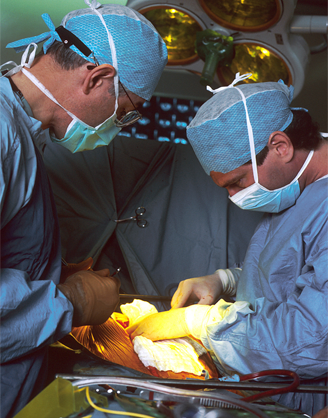Technique Reduces Colorectal Surgery Infections
A systematic, best-practice approach to colorectal surgery can decrease the risk of surgical site infections, according to a new study.
A new approach to colorectal surgery can reduce the risk of infections.

A systematic, best-practice approach to colorectal surgery can decrease the risk of surgical site infections, according to a study published today in JAMA Surgery.
While improving adherence to evidence-based practices during surgery can improve outcomes, this has not generally been shown to improve infection rates. In the current study, Christopher R. Mantyh, MD, of the department of surgery at the Duke University Medical in North Carolina, and colleagues tested whether a systematic approach known as a “bundle”-which incorporates several optimal surgical techniques-could reduce the rates of infections in patients undergoing colorectal surgery.
The researchers found that using the bundle approach lowered the rates of superficial surgical site infections from 19.3% to 5.7%, and postoperative sepsis from 8.5% to 2.4%.
For the patient, the bundle approach included a disinfecting shower before surgery, antibiotics, and then specific wound-care instructions upon discharge. Surgeons and surgical room staff did a gown and glove change prior to closure of the wound, and a dedicated wound closure tray was used to seal up the skin. The approach, led by the team of colorectal surgeons, included the entire multidisciplinary team of surgeons, nurses, anesthesiologists, and hospital staff.
Surgical site infections are associated with increased morbidity, increased length of hospitalization, re-admission, and higher healthcare costs. Colorectal surgeries have a particularly high rate of these complications, ranging from about 15% to 30%.
In this study, superficial surgical site infections were associated with a 35% higher variable cost ($13,253 compared to $9,779) and an almost 72% increase in the length of a hospital stay (7.9 days compared to 4.6 days).
Still, the rates of deep surgical site infections, organ surgical site infections, wound disruption, length of hospital state, and 30-day re-admission rates did not differ between surgeries that incorporated the bundle and those that did not.
This study “demonstrates that substantial surgical site infection reduction can be achieved at an institution having a pre-existing problem with high surgical site infections rates in colorectal surgery,” conclude the authors. Still, “further study is needed to assess whether the bundle can be effective with wider application and what level of compliance with bundle measures is needed to achieve good results.”
In an accompanying editorial, Ira L. Leeds, MD, MBA, and Elizabeth C. Wick, MD, of Johns Hopkins University in Baltimore, Maryland, write that “for colorectal surgery, the leading harm is surgical site infections, but strong initiatives to reduce these have stalled because of a lack of clear evidence to support that improvement is possible.” This study and others “support that colorectal surgical site infection is a preventable harm with adherence to published evidence, best practice guidelines, and culture change,” conclude the editorial authors.
Study Details
The researchers retrospectively analyzed patients who underwent colorectal surgery between 2008 and 2012 at the Duke University Medical Center. Of the 559 patients included in the analysis, 346 (61.9%) had surgery before the bundle technique was implemented in 2011. A matched set of pre- and post-bundle groups each had 212 patients.
The pre-bundle group was slightly older (median age of 62.2 compared with 58.7 years of age) and had a higher percentage of patients who had received pre-operative radiation therapy (19.1% compared with 12.2%) while a lower proportion of pre-bundle patients had recently received chemotherapy (5.5% compared with 14.6%).